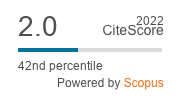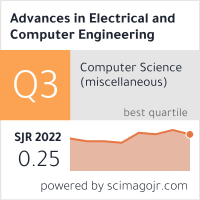| 4/2014 - 6 |
Performance Analysis of Turbo-Coded Decode-and-Forward Relay Channels with Middleton Class-A Impulsive NoiseANDREI, M. |
| View the paper record and citations in |
| Click to see author's profile in |
| Download PDF |
Author keywords
decode-and-forward, impulsive noise, iterative decoder, relay channels, turbo codes
References keywords
communications(9), turbo(6), noise(6), cooperative(6), channel(6), relay(5), performance(4), impulsive(4), decode(4), coded(4)
Blue keywords are present in both the references section and the paper title.
About this article
Date of Publication: 2014-11-30
Volume 14, Issue 4, Year 2014, On page(s): 35 - 42
ISSN: 1582-7445, e-ISSN: 1844-7600
Digital Object Identifier: 10.4316/AECE.2014.04006
Web of Science Accession Number: 000348772500006
SCOPUS ID: 84921649589
Abstract
Relays are used to improve wireless network performances. In this paper, the decode-and-forward relaying technique is used to achieve spatial diversity. We considered a system with a symmetric turbo coded relay and its three channels (source-relay, source-destination and relay-destination) affected by impulsive noise. The statistic model used for noise was Middleton additive white Class-A. The performances are evaluated by investigating the system behavior when at destination the traditional iterative decoder and the heuristically modified iterative decoder proposed by Huynh are used. The simulations were made for different parameter values of the noise model and they showed that in high impulsive noise conditions, the relay system offers better performance than the direct link. However, when the source-destination channel is weak, the traditional iterative decoder assures an additional gain than the heuristically modified one. When the Gaussian component is dominant, the relay system ensures better performances, but only at high values of Signal-to-Noise Ratio. In this case, the heuristically modified decoder, with conveniently chosen value for alpha, is better than the traditional one in terms of bit error rate. |
| References | | | Cited By |
Web of Science® Times Cited: 2 [View]
View record in Web of Science® [View]
View Related Records® [View]
Updated today
SCOPUS® Times Cited: 3
View record in SCOPUS® [Free preview]
View citations in SCOPUS® [Free preview]
[1] Correction Impulse Method for Turbo Decoding over Middleton Class-A Impulsive Noise, TRIFINA, L., TARNICERIU, D., ANDREI, M., Advances in Electrical and Computer Engineering, ISSN 1582-7445, Issue 4, Volume 16, 2016.
Digital Object Identifier: 10.4316/AECE.2016.04011 [CrossRef] [Full text]
[2] A Survey on Impulsive Noise Models Removal Techniques Based on Adaptive Filter in ECG Signal, Hamlili, Heyem, Kameche, Samir, Abdelmalek, Abdelhafid, 2018 International Conference on Electronics, Control, Optimization and Computer Science (ICECOCS), ISBN 978-1-5386-7868-8, 2018.
Digital Object Identifier: 10.1109/ICECOCS.2018.8610610 [CrossRef]
Disclaimer: All information displayed above was retrieved by using remote connections to respective databases. For the best user experience, we update all data by using background processes, and use caches in order to reduce the load on the servers we retrieve the information from. As we have no control on the availability of the database servers and sometimes the Internet connectivity may be affected, we do not guarantee the information is correct or complete. For the most accurate data, please always consult the database sites directly. Some external links require authentication or an institutional subscription.
Web of Science® is a registered trademark of Clarivate Analytics, Scopus® is a registered trademark of Elsevier B.V., other product names, company names, brand names, trademarks and logos are the property of their respective owners.
Faculty of Electrical Engineering and Computer Science
Stefan cel Mare University of Suceava, Romania
All rights reserved: Advances in Electrical and Computer Engineering is a registered trademark of the Stefan cel Mare University of Suceava. No part of this publication may be reproduced, stored in a retrieval system, photocopied, recorded or archived, without the written permission from the Editor. When authors submit their papers for publication, they agree that the copyright for their article be transferred to the Faculty of Electrical Engineering and Computer Science, Stefan cel Mare University of Suceava, Romania, if and only if the articles are accepted for publication. The copyright covers the exclusive rights to reproduce and distribute the article, including reprints and translations.
Permission for other use: The copyright owner's consent does not extend to copying for general distribution, for promotion, for creating new works, or for resale. Specific written permission must be obtained from the Editor for such copying. Direct linking to files hosted on this website is strictly prohibited.
Disclaimer: Whilst every effort is made by the publishers and editorial board to see that no inaccurate or misleading data, opinions or statements appear in this journal, they wish to make it clear that all information and opinions formulated in the articles, as well as linguistic accuracy, are the sole responsibility of the author.





